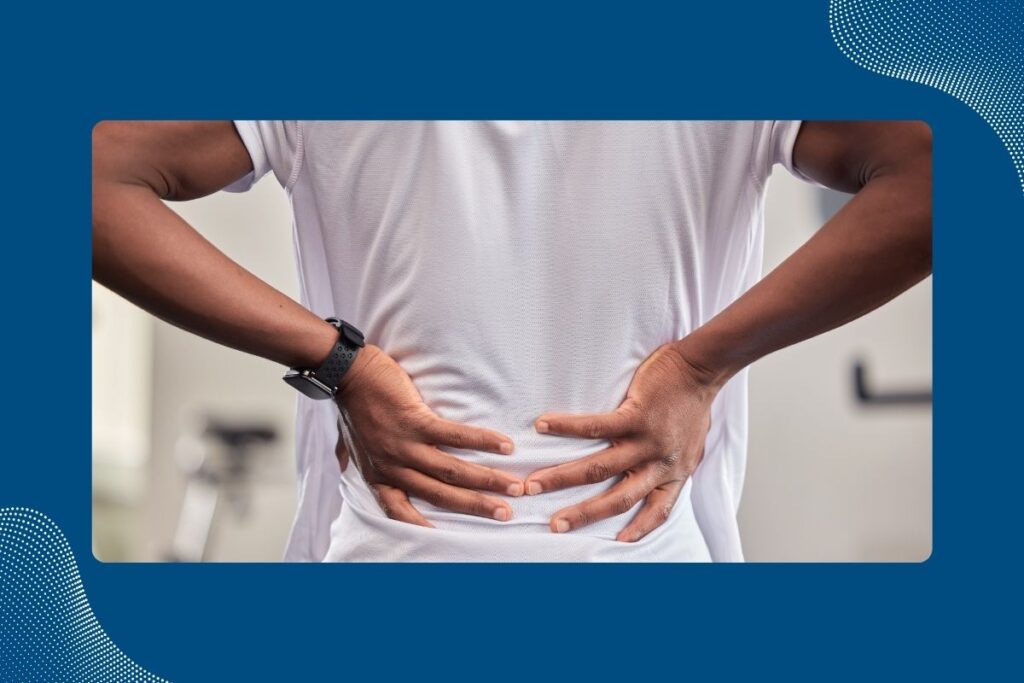Can Hip Pain Cause Back Pain?

Hip pain and back pain are common issues that affect many people, often leading to discomfort and limited mobility. Understanding the connection between these two types of pain is crucial for accurate diagnosis and effective treatment. This blog explores how hip pain can cause back pain and offers insights into managing and preventing these conditions.
Understanding Hip Pain
Hip pain can result from various conditions, including arthritis, bursitis, tendonitis, and injuries. Symptoms of hip pain often include discomfort in the groin, thigh, or buttocks, stiffness, and a limited range of motion. Recognizing the root cause of hip pain is essential for addressing it effectively.
Understanding Back Pain
Back pain is a widespread issue with numerous potential causes, such as muscle strain, herniated discs, and spinal stenosis. Symptoms of back pain can range from localized pain to radiating pain, numbness, and tingling. Like hip pain, understanding the underlying cause of back pain is key to proper treatment.
The Link Between Hip Pain and Back Pain
Hip pain can lead to back pain through various mechanisms. When hip pain alters the way you walk (your gait), it can create muscle imbalances and place additional stress on the lower back. Anatomically, the hip and lower back are closely connected, and conditions like sciatica and sacroiliac joint dysfunction can affect both areas. This interconnectedness means that issues in the hip can easily translate to problems in the back.
Clinical Evidence and Case Studies
Medical literature supports the link between hip pain and back pain. Studies have shown that patients with hip issues often experience secondary back pain. Case studies demonstrate that treating hip pain can alleviate back pain, highlighting the importance of considering both areas in diagnosis and treatment. Orthopedic surgeons and physical therapists emphasize the need for a holistic approach to managing these conditions.
Diagnosis and Differentiation
Differentiating between hip pain and back pain is crucial for effective treatment. Diagnostic tools like MRI and X-rays, combined with a thorough physical examination, help identify the source of the pain. A detailed medical history and symptom review are also essential. Understanding the specific symptoms and their origins allows healthcare providers to develop targeted treatment plans.
Treatment Options
Treatment for hip and back pain often begins with conservative methods. Physical therapy and specific exercises can help strengthen muscles, improve flexibility, and alleviate pain. Medications such as anti-inflammatories and muscle relaxants can reduce discomfort. Interventional treatments like injections or nerve blocks may be necessary for more severe cases. Surgery, such as hip replacement or spinal surgery, is considered when conservative treatments fail.
Self-Care and Prevention
Managing and preventing hip and back pain involves lifestyle changes. It is crucial to maintain a healthy weight, practice proper posture, and engage in regular exercise. At home, pain can be relieved with rest, ice, heat, and stretching. Ergonomic adjustments at work and home, along with targeted exercises, can support hip and back health, reducing the risk of pain.
When to See a Doctor
Certain symptoms indicate the need for medical evaluation. Severe pain, persistent symptoms, and neurological signs like numbness or weakness should prompt a visit to a healthcare professional. Early intervention is vital to prevent complications and improve treatment outcomes. If you experience chronic hip or back pain, seeking medical advice is essential for effective management.
Key Takeaways
Due to the close anatomical and functional connection between these areas, hip pain can indeed cause back pain. Understanding this relationship is crucial for accurate diagnosis and effective treatment. If you experience symptoms of hip or back pain, seeking medical advice can help you manage and prevent these conditions, ensuring better overall health and mobility.
FAQs
1. Can hip pain actually cause back pain?
Yes, hip pain can indeed cause back pain. This occurs due to the close anatomical and functional connection between the hip and lower back. When the hip is in pain, it can alter the way you walk (your gait), leading to muscle imbalances and additional stress on the lower back. Conditions such as sciatica and sacroiliac joint dysfunction, which affect both the hip and lower back, further illustrate this link. Treating the underlying hip issue often alleviates the associated back pain.
2. How can I tell if my back pain is caused by hip problems?
To determine if back pain is caused by hip problems, it’s important to look at the overall pattern of symptoms and undergo a thorough evaluation. If your back pain is accompanied by groin, thigh, or buttock pain, stiffness, or a limited range of motion in the hip, it may be related to hip issues. Diagnostic tools such as MRI and X-rays, combined with a physical examination and a detailed medical history, can help identify the source of the pain and distinguish between hip-related back pain and other causes.
3. What treatments are available for back pain caused by hip issues?
Treatment for back pain caused by hip issues typically involves a combination of approaches. Physical therapy with exercises to strengthen the muscles supporting the hip and back, as well as stretching routines to improve flexibility, are often recommended. Medications such as NSAIDs can help reduce inflammation and pain. In more severe cases, interventional treatments like corticosteroid injections or nerve blocks may be necessary. Surgery, such as hip replacement or spinal surgery, is considered when conservative treatments fail. Lifestyle modifications, including maintaining a healthy weight, practicing good posture, and regular exercise, are also crucial for managing and preventing pain.